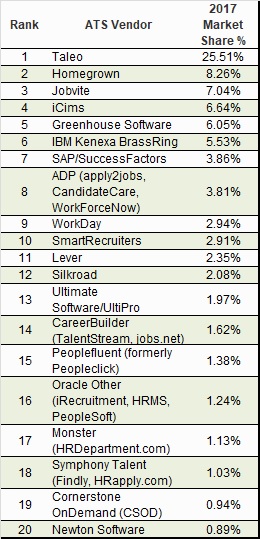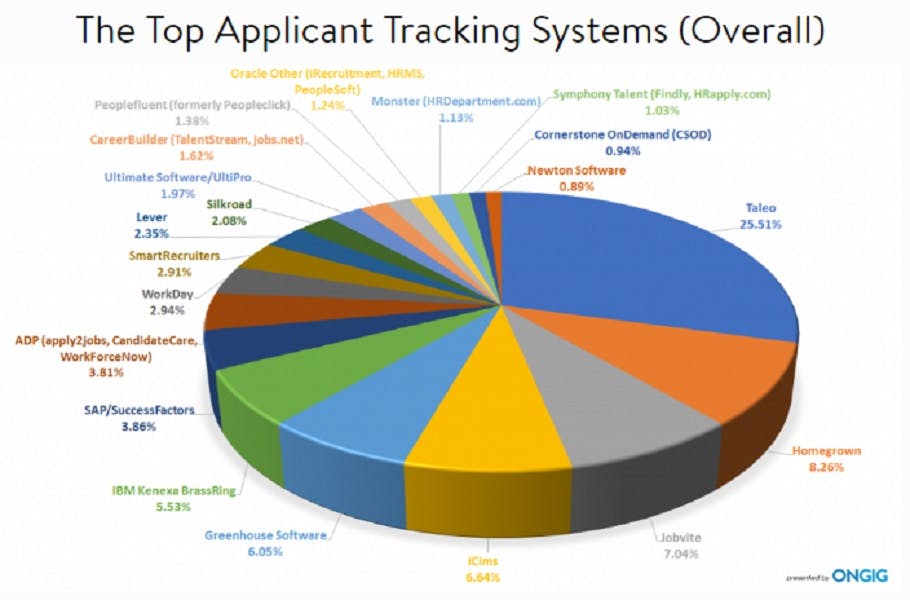I’ve said this a number of times, but it’s the question that never goes away. It’s the single most asked question I get in person, online, through email and messaging. There hasn’t been a week go by in the past two years where I’m not asked in some form this question!
The question comes in a number of variations:
- Which ATS do you use?
- Which ATS should we use?
- Which ATS is the best?
I get it! Talent acquisition is finally moving from awkward teen to young adult. It’s time we stop driving the hand-me-down beater and buy our first new car! We don’t want to make a bad choice and buy a lemon, and unfortunately, Consumer’s Report has yet to give us a list of the ATS “Best Buys.”
This is one reason I love Ongig’s, and Rob Kelly’s continued research and analysis of the applicant tracking market. This past week Ongig released their 2017 version of The Top Applicant Tracking Systems Annual Report. I love this report because there’s nothing else like it on the planet! I also like it because the ATS vendors try and tear it apart, which tells me it’s probably fairly accurate!
If it wasn’t good, they would make fun of it and laugh it off. We see that frequently with these types of reports that are built on bad data, but this report hits them differently, and most find some value out of what it’s saying. I’ll say, that the 2017 report is far and away the best one that Rob and Ongig have put out!
The data comes from over 3,000 employers from SMB to enterprise, so a great sample size.
Here are some highlights from the report:

There are hundreds of ATSs on the market, but Ongig found about 99 ATSs make up almost 100% of the market.
“Homegrown” is not the name of an ATS (although you could now get some great SEO if you changed your ATS name to “Homegrown”!) it means a company built their own, or they’re using MS Excel, etc.
Depending on how many jobs you have open at one time, there’s a popular ATS for your size:
- 1000+ job openings (Enterprise) – Taleo, IBM Kenexa and iCims are the top three (TalentStream by CareerBuilder is one that pops up here with a good chunk of market share that I would think would surprise people. Built in the last two years, TalentStream is more advanced from a technology perspective than most of the big boys.)
- 999 to 250 (Large) – Taleo, IBM Kenexa, and iCims
- 249 to 100 (Mid to Large) – Taleo, iCims, and Kenexa are the top three, but #4 you begin to see Jobvite.
- 99 to 25 (Mid) – Taleo, Jobvite, and Greenhouse. I’ll say if you have under 100 job openings at any one time there is no reason you should be using Taleo!
- 24 to 10 (SMB) – Greenhouse, Taleo, Lever and SmartRecruiters.
- 0 to 9 (Small) – SmartRecruiters, Greenhouse, Lever.
The “Fastest Growing ATSs” category might be a better gauge at what ATSs you should be demoing! Those are (in order): Greenhouse, SmartRecruiters, WorkDay, and Lever. I’ll say WorkDay gets in under “fastest” growing, but only because they convert their HRIS clients over to the recruiting product.
The top ATSs for staffing agencies are: Bullhorn, PC Recruiter, BrightMove, CATS ATS, Crelate, and Compas. The problem here is most are built for direct-hire staffing and not contingent staffing, which is growing fast and will continue. The contingent market is different in that it needs an ATS that also flows into a pay-bill backend, which no one has yet figured out how to have great ATS technology and solid backend pay-bill.
Tons of organizations every year switch which from one ATS to another. You see companies going from Taleo to Workday, iCims to Taleo, Taleo to iCims, Jobvite to Greenhouse, etc. What I find in most of these situations is the new company leader who implemented the original system has left and the new leader wants something they’re familiar with or just something new. Rarely are they actually upgrading to an ATS that is noticeably better.
Go check out the full report over at Ongig.
So, which ATS is the best? That is completely dependent on you and your needs. If you really want to know what I think, send me a note and I’ll give you an opinion based on a few things like the size of your organization and what your needs are.
This article originally published on The Tim Sackett Project.
